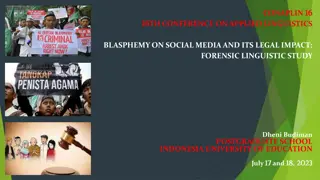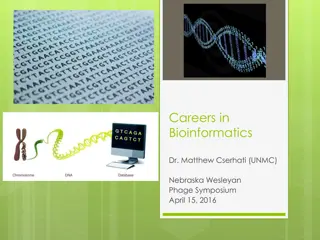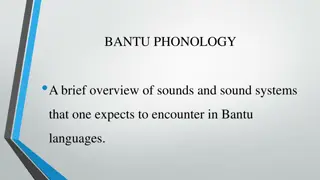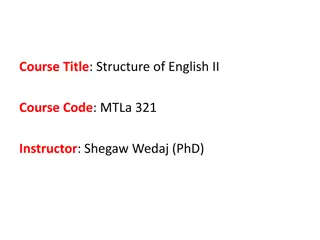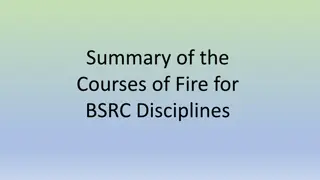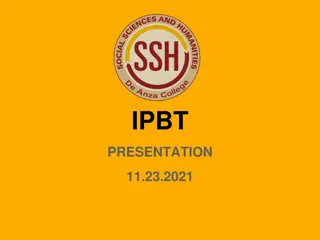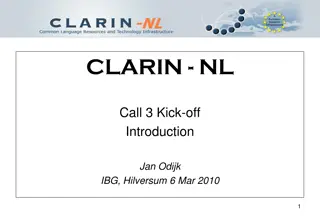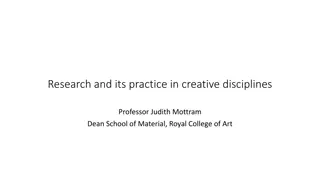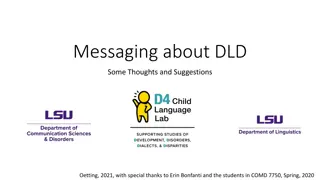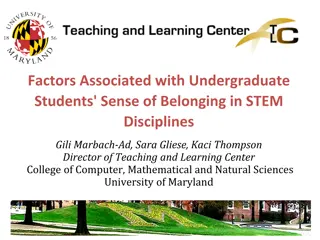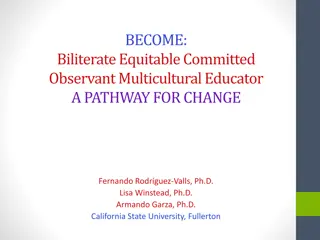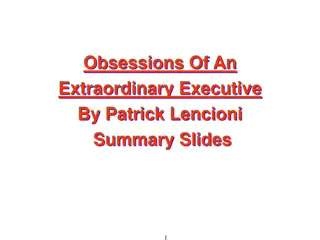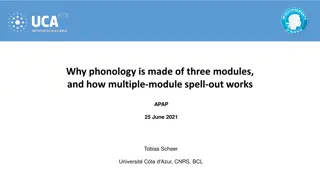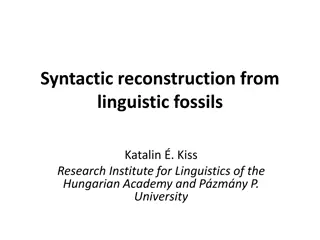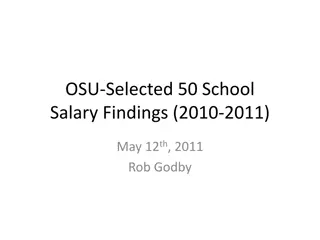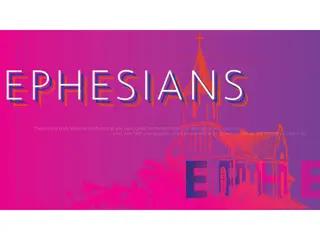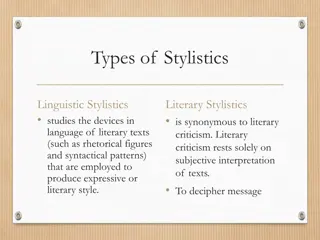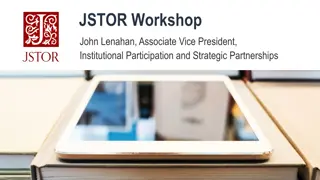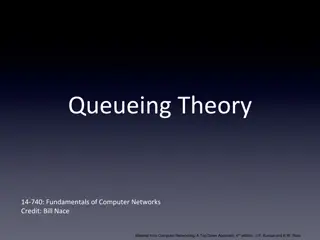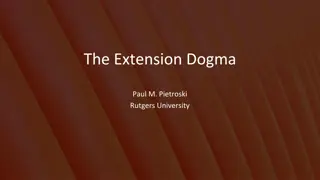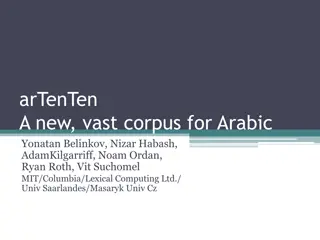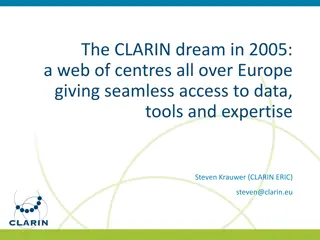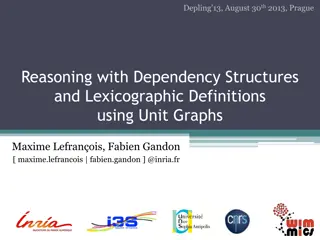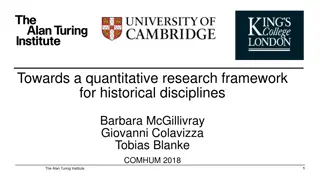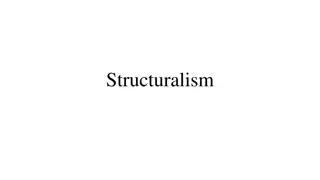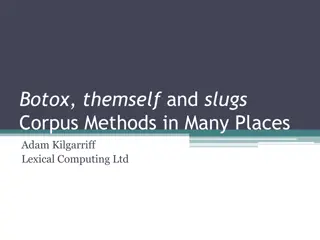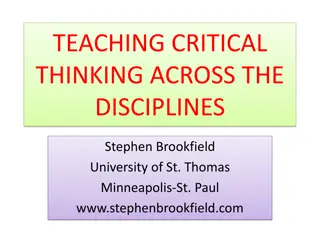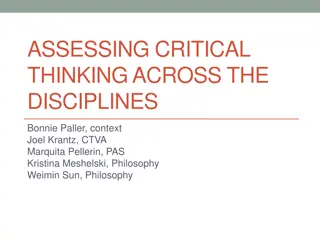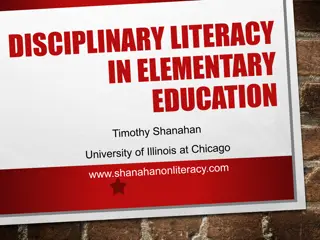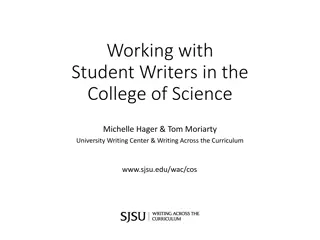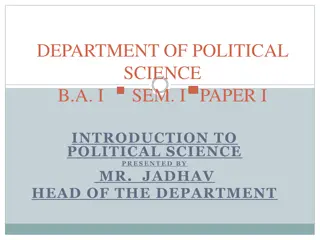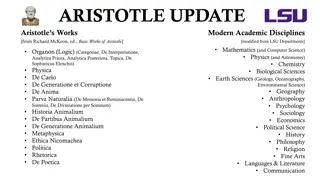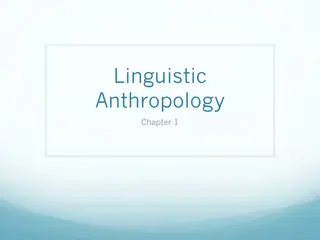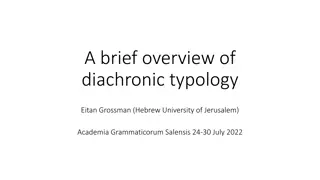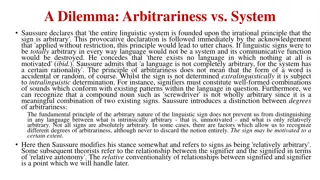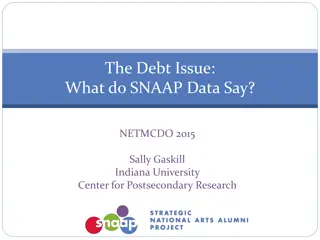Impact of Blasphemy on Social Media: Forensic Linguistic Analysis
Language plays a crucial role in human communication, especially on social media platforms where public speech can have legal consequences. This research delves into the concept of blasphemy on social media and its legal implications, focusing on linguistic forensic study. It explores how language c
7 views • 24 slides
The Significance of Media in Language Learning
Media plays a crucial role in language learning by raising awareness of the ideology behind linguistic structures and providing valuable information on society and culture. Linguists are drawn to media language for research purposes and to understand its impact on language use and attitudes. Media s
11 views • 5 slides
Overview of Stilistik in Bachelor's Studies
Stilistik in a Bachelor's program covers theoretical basics, stylistic concepts, micro and macro stylistics, and key texts in the field. It explores stylistic analysis, linguistic disciplines, communication styles, and the impact of style on various forms of expression including everyday communicati
6 views • 63 slides
Exploring Bioinformatics: Careers, Research, and Disciplines
Bioinformatics is an interdisciplinary field combining biology, computer science, mathematics, and statistics. Dr. Matthew Cserhati, a bioinformatics programmer, has a background in biology and software engineering. His research includes projects like NeuroAIDS database development and Staphylococcu
2 views • 46 slides
Exploring Bantu Phonology and Linguistic Classification
Delve into the intriguing world of Bantu phonology and linguistic classification, covering the diverse sounds and phonological processes found in Bantu languages. Discover the rich heritage of over 500 Bantu languages in sub-Saharan Africa, classified into zones and classes, shedding light on the fa
0 views • 38 slides
Understanding Structural Linguistics: An Exploration of Language and Signs
Delve into the intricate world of structural linguistics through an in-depth analysis of language components, linguistic signs, and the relationship between language and linguistics. Explore the concepts of syntagmatic vs. paradigmatic relations, linguistic signs as associations of sound and meaning
4 views • 62 slides
Courses of Fire for BSRC Disciplines
Moving targets such as Running Deer, Running Boar, and Running Target are disciplines commonly shot from the standing position without support in BSRC competitions. Each discipline has specific courses of fire, including the number of runs, direction, shot count, and allowed shooting aids. Additiona
1 views • 17 slides
Overview of Media Studies Disciplines and Historical Development
Media studies is a multidisciplinary field that explores the content, history, and effects of various media, with roots in the relationship between media and culture. Originating in the 1920s, media studies draws on traditions from social sciences and humanities, incorporating theories from discipli
5 views • 18 slides
Social Sciences & Humanities Faculty Division Overview
This presentation provides an overview of the Social Sciences & Humanities faculty division within the institution. It includes information on full-time faculty members, chairs, and the dean's office. The faculty chart lists the various disciplines such as Paralegal, Administration of Justice, Econo
0 views • 5 slides
Overview of CLARIN-NL Call 3 Projects and Developments
The document provides an overview of the CLARIN-NL Call 3 projects and developments, including information on submissions, awarded projects, disciplines covered, distribution by prioritized disciplines, and subdisciplines of linguistics. It details the open and closed calls, selected disciplines, an
0 views • 28 slides
Gospel-Powered Spiritual Disciplines: Fasting and Reflection on Biblical Teachings
Reclaiming the essence of Gospel-powered spiritual disciplines, focusing on fasting, prayer, and solitude. Reflecting on teachings from Luke 5:33-39 and Matthew 6:1-18 about humility, sincerity, and the rewards of true piety.
1 views • 33 slides
Enhancing Research and Learning in Creative Disciplines
Explore the role of research in creative disciplines, the importance of universities in fostering knowledge exchange, and initiatives like the UK Higher Education Funding Council and EU programs to enhance research, learning, and innovation in higher education.
6 views • 52 slides
Linguistic Microaggressions in Messaging about DLD: Thoughts and Suggestions
Linguistic microaggressions in the discourse surrounding Developmental Language Disorder (DLD) can perpetuate negative stereotypes and harm individuals. This content discusses the concept of linguistic microaggressions, explores the ambiguity in messaging about DLD, and highlights the importance of
3 views • 12 slides
Factors Affecting Undergraduate Students' Sense of Belonging in STEM Disciplines
Student attrition in STEM fields remains a critical issue, with women and underrepresented minority students facing higher dropout rates. Sense of belonging is identified as a key factor influencing retention, particularly for female and URM students. This study explores various aspects, including r
0 views • 22 slides
Culturally Responsive Biliteracy in Inclusive Education
Culturally responsive biliteracy in inclusive education emphasizes the importance of teaching in two languages, valuing diverse cultural and linguistic identities, and creating a participatory and inclusive classroom environment. Educators play a crucial role in fostering language development and ac
0 views • 12 slides
The Four Disciplines of a Healthy Organization Summary Slides
The book "Obsessions of an Extraordinary Executive" by Patrick Lencioni outlines the Four Disciplines of a Healthy Organization, emphasizing the significance of organizational clarity, cohesive leadership teams, and effective communication. Lencioni highlights the importance of minimizing confusion,
0 views • 7 slides
The Three Modules of Phonology and Multiple-Module Spell-Out Systems
Phonology is structured into three modules - Sonority, Laryngeal, and Place - each with its own vocabulary and skeleton for computation. These modules interact in multiple-module spell-out systems to map linguistic structures onto phonetic realizations. Sonority, involving the audibility of linguist
0 views • 67 slides
Syntactic Reconstruction from Linguistic Fossils in Uralic Languages
Linguistic fossils provide valuable insights for syntactic reconstruction in Uralic languages like Hungarian, Eastern Khanty, and Samoyedic. Through a case study, constraints on topical objects and grammatical systems are examined using linguistic fragments.
0 views • 34 slides
Comparison of Faculty Salaries in UW Disciplines
Analysis of faculty salary data for Professors, Associate Professors, and Assistant Professors in selected UW disciplines compared to the average across 50 schools and OSU in 2010-2011. The findings show varying salary percentages in different disciplines and ranks. Notable trends include assistant
0 views • 9 slides
Embracing Spiritual Disciplines for Growth in Christ
Explore the importance of spiritual disciplines in deepening your relationship with Christ. Discover how these practices, rooted in Scripture, can help you emulate God's love, prioritize your faith, and reject misconceptions about earning grace. Understand that true discipline does not confine but r
0 views • 16 slides
Understanding Linguistic and Literary Stylistics
Linguistic Stylistics explores devices in language of literary texts to create expressive styles. Literary criticism relies on subjective interpretation, while Stylistic Analysis in linguistics identifies patterns in speech and writing. This content delves into the phonological, graphological, and l
0 views • 17 slides
Exploring JSTOR's Impact on Student Engagement and Academic Research
Discover how JSTOR, through its innovative approach, supports student engagement and academic research across diverse disciplines and institutions. Learn about the significant role JSTOR plays in shaping educational experiences and enhancing scholarly pursuits, as evidenced by its usage in secondary
0 views • 26 slides
Understanding Queueing Theory in Computer Networks
Queueing theory is a powerful analytic tool used to analyze performance in queueing processes, applicable in various industries including retail, manufacturing, and computer networks. It involves studying characteristics such as arrival patterns, service patterns, and queue disciplines to make perfo
0 views • 61 slides
The Extension Dogma: Exploring Meaning and Extensions in Linguistic Expressions
The Extension Dogma challenges the assumption that linguistic expressions inherently possess meanings. Instead, it posits that expressions have extensions without necessary meanings that determine them. Theories of meaning should focus on the extensions of expressions, while psychological studies of
0 views • 30 slides
Introduction to arTenTen: A New Vast Corpus for Arabic Linguistic Processing
arTenTen is a new corpus for Arabic containing a vast array of text types, rich metadata, and clean linguistic processing capabilities. It offers a significant improvement over existing Arabic corpora, presenting a larger dataset with a variety of linguistic features. The corpus is fully processed,
0 views • 8 slides
Exploring the CLARIN Dream: Language, Data, and Expertise Across Europe
The CLARIN project, initiated in 2005, aims to provide seamless access to data, tools, and expertise through a network of centres across Europe. By leveraging interoperability standards, researchers can consult catalogues, access text collections, and analyze linguistic resources from various countr
0 views • 5 slides
Reasoning with Dependency Structures and Lexicographic Definitions using Unit Graphs
This piece discusses the application of knowledge representation in addressing recurrent needs related to manipulating, querying, reasoning, and sharing information, particularly in the linguistic domain of Meaning-Text Theory. Maxime Lefrançois and Fabien Gandon explore formalisms, such as the the
0 views • 56 slides
Quantitative Research Framework for Historical Disciplines
Scholarly communities in historical disciplines are combining quantitative and qualitative methods to study phenomena that change over time. The proposed general methodological reflection aims to enhance research in historical linguistics through quantitatively driven models and claims. Quantitative
0 views • 18 slides
Understanding Structuralism in Linguistics: An Overview
Structuralism emerged as a dominant approach in linguistic studies from the 1920s to the 1960s, led by figures like Ferdinand de Saussure. This philosophical perspective focused on the study of language as a stable system of signs, emphasizing the interrelation of mental representations of sounds an
1 views • 28 slides
Understanding Linguistic Features in Trademarks and Branding
Explore the nuances of linguistic features in trademarks and branding through topics such as generic vs. name-like words, trade mark infringement cases, capitalization norms, and the significance of corpus analysis in understanding language usage in branding. Discover how linguistic expertise plays
0 views • 22 slides
Enhancing Critical Thinking: Strategies and Practices Across Disciplines
Explore the multifaceted dimensions of critical thinking in teaching and learning across various disciplines. Uncover the importance of identifying assumptions, the role of different traditions in promoting critical thought, and practical techniques like the Circle of Voices. Discover how critical t
0 views • 16 slides
Enhancing Critical Thinking Skills Across Disciplines
Explore strategies for fostering critical thinking skills through various disciplines, including identifying levels of critical thinking, designing effective assignment prompts, and addressing real-world issues like sustainability and political participation. Understand the importance of prompting r
0 views • 31 slides
Exploring Disciplinary Literacy in Education
Educators have long emphasized the importance of content area reading to improve students' comprehension and study skills across various subjects. However, disciplinary literacy goes beyond basic reading skills, focusing on how different disciplines create, communicate, and evaluate knowledge throug
0 views • 42 slides
Enhancing Student Writers' Skills in Science Disciplines
Student writers in the College of Science may struggle with transferring writing skills to new contexts. This article explores why writers forget and provides strategies for teachers to assist students in mastering unique writing genres within science disciplines.
0 views • 25 slides
Introduction to Political Science: State, Democracy, and Sub-disciplines
Explore the fundamental concepts in political science including the state, democracy, and sub-disciplines such as political theory, public administration, and international politics. Delve into the meaning, definition, and nature of political science as well as the essential components of the state
0 views • 5 slides
Aristotle's Works in Modern Academic Disciplines and Political Science
Explore Aristotle's works in disciplines such as Mathematics, Physics, Logic, Chemistry, Political Science, and more. Delve into his insights on political theory, regimes, and governance for the common good and ruler's advantage.
0 views • 6 slides
Understanding Linguistic Anthropology and Anthropology: A Comprehensive Overview
Delve into the realm of linguistic anthropology and anthropology to explore the study of humans, culture, language, biology, artifacts, and more. Discover the four fields of anthropology, the holistic approach, and the importance of cultural relativism while avoiding ethnocentrism. Learn how linguis
0 views • 25 slides
Exploring Diachronic Typology and Linguistic Diversity
Delve into the fascinating realm of diachronic typology and linguistic properties across languages in time and space. Uncover the distribution of linguistic features, the past tense in various languages, and the underlying constraints shaping language structures. Discover the intricate interactions
0 views • 99 slides
The Principle of Arbitrariness in Linguistic Signs: Saussure's Insight
Saussure's declaration on the arbitrariness of linguistic signs is thought-provoking, emphasizing that while signs are arbitrary, complete arbitrariness would lead to chaos. He distinguishes between degrees of arbitrariness and acknowledges that signs are not entirely arbitrary, being subject to lin
0 views • 9 slides
The Impact of Student Loan Debt on Music Majors: A SNAAP Data Analysis
SNAAP data reveals insights into student loan debt among music majors, showing trends in debt levels, disciplines, recent vs. non-recent graduates, and the impact of debt on music education. The findings highlight the financial challenges faced by music students and the varying levels of debt incurr
0 views • 15 slides
